- Navigator
- Southeast
- Real Estate Development and Housing
- Retail, Services, and Accommodations
This article is the third installment in a four-part series examining the role of the shopping mall within the US economy and their popularity, decline, and revival.
Welcome to the third part of my series on the transformation of American shopping malls. In this article, we’ll continue our exploration of mall redevelopment and revitalization projects across the country, and take a closer look at another mall redevelopment project in Richmond, VA.
Virginia Center Commons: A Look Back
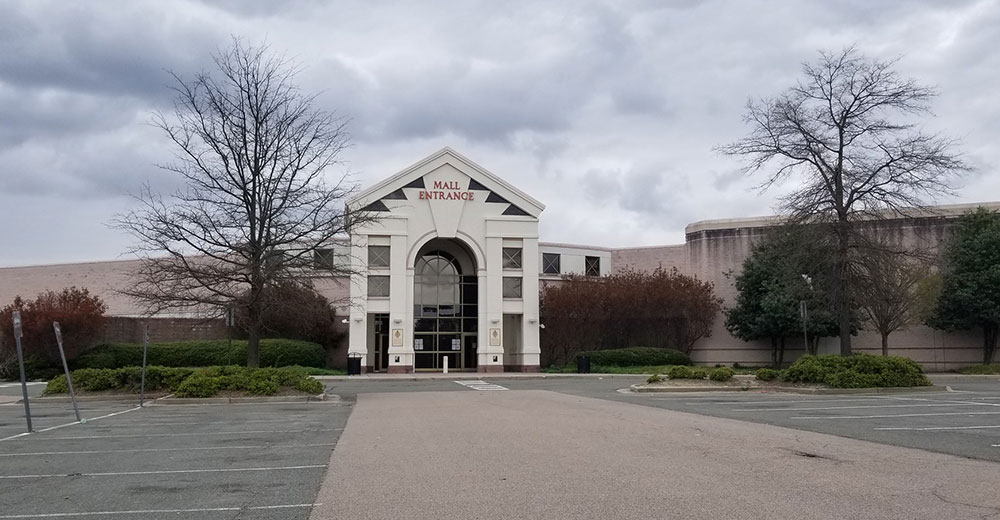 Photo Credit: “Virginia Center Commons Richmond, VA March 2019” by MikeKalasnik is licensed under CC BY-SA 2.0
Photo Credit: “Virginia Center Commons Richmond, VA March 2019” by MikeKalasnik is licensed under CC BY-SA 2.0
Virginia Center Commons is located in northern Henrico County along US Route 1 near Interstates 295 and 95. It opened in 1991 with a food court, arcade, and around 50 tenants. Initially anchored by three major department stores — JCPenney, Sears, and Hecht’s (later Macy’s) — it later expanded to include two Dillard’s stores (formerly Proffitt’s and Leggett, a division of Belk). In 1995, the Regal Virginia Center movie theatre opened next door to the mall.
With 966,00 square feet of retail space, at its peak Virginia Center Commons boasted over 100 retail stores, restaurants, and diverse amenities, making it a shopping hotspot in the Richmond metro area. Notably, it was the last all-indoor mall built in the region.
Virginia Center Commons instantly became a beloved destination, drawing in individuals and families of all ages seeking both leisure and social interactions. I can remember spending many weekends in my teenage years shopping at The Disney Store, The Limited, Old Navy, The Shoe Department, and Claire’s, catching a bite to eat at Ruby Tuesday, and then playing some games at the Fun N Games Arcade. The mall was very much a vibrant community hub, offering not just shopping and dining but also hosting a variety of events, from fashion shows to car exhibitions.
However, after more than 30 years in the community, Virginia Center Commons terminated the leases of its remaining tenants and closed permanently on October 31, 2022. The mall, except for American Family Fitness (added in 2014), was later demolished and is now being reborn as a dynamic mixed-use development that will feature hotels, retail and entertainment spaces, and residential housing, all anchored by an indoor sportsplex.
So, if the mall was so popular, what happened?
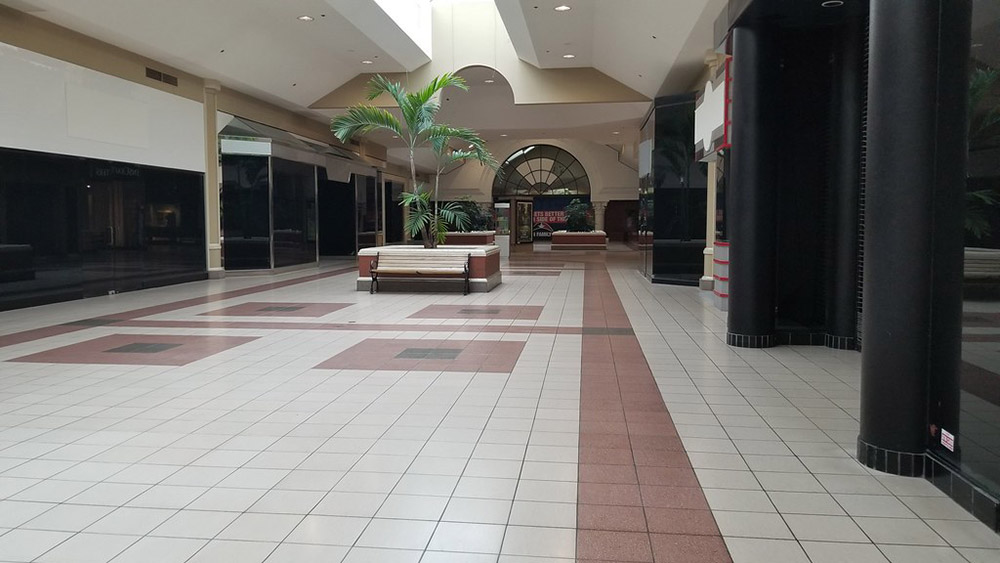 Photo Credit: “Virginia Center Commons Richmond, VA March 2019” by MikeKalasnik is licensed under CC BY-SA 2.0
Photo Credit: “Virginia Center Commons Richmond, VA March 2019” by MikeKalasnik is licensed under CC BY-SA 2.0
Beginning in the early 2000s, Virginia Center Commons encountered a series of challenges similar to those faced by malls nationwide, including shifts in consumer preferences, the rise of online shopping, competition from newer outside malls, prominent store closures, anchor store exits, the impact of COVID-19, and outdated aesthetics. By 2019, the mall’s owner was also facing several lawsuits from the county and a former tenant.
From 2003 to 2012, Virginia Center Commons’ assessed value plummeted from $154 million to $71 million, marking a significant decline. Between 2017 and 2018, the shopping center’s value fell again from $28.5 million to $15.8 million.
Originally owned by Simon Property Group, the mall changed hands twice in the 2010s, being passed to Washington Prime Group in 2014 and to Kohan Retail Investment Group in 2017. Then, in early 2020, The Rebkee Co. and Shamin Hotels acquired the mall, along with the former Macy’s and Sears buildings, totaling 76.43 acres, for $12.8 million. This sale marked the beginning of a transformative journey for the mall.
A Look Around: Retail Surrounding Virginia Center Commons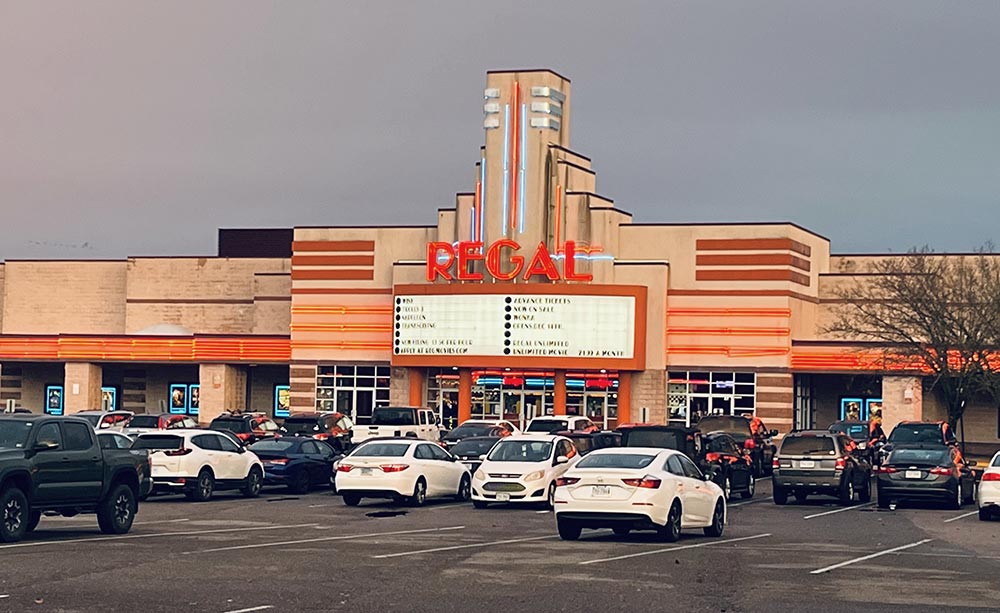
The area around the Virginia Center Commons has been a dynamic, evolving retail landscape over the years. All around the mall property, a diverse array of establishments have taken root, including restaurants, a movie theater, hotels, and general retail and services.
However, this adjacent commercial growth had several negative impacts on the mall:
- Decreased Foot Traffic: Proximity to alternative retail options redirected many customers away from the mall.
- Intensified Competition: Newer retail developments offered more attractive leasing terms and amenities, making it challenging for the mall to retain or attract businesses.
- Tenant Turnover: As businesses inside the mall struggled to compete, vacancies rose, affecting the overall appeal of the mall to consumers.
Virginia Center Commons’ Next Chapter: A Place to Live, Work, and Play
The transformation of Virginia Center Commons into a multi-faceted community hub is well underway.
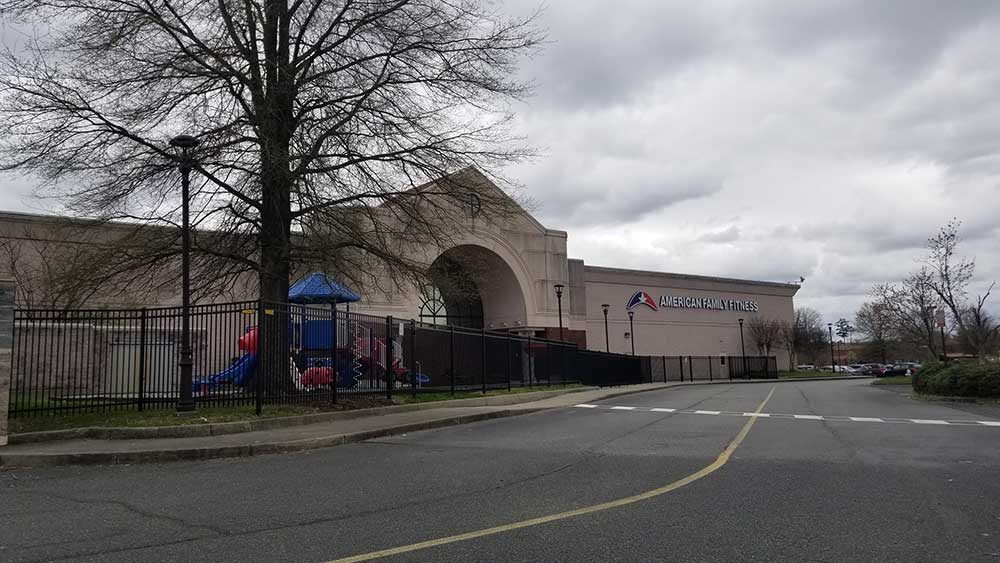
Photo Credit: “Legget/Dillards – Virginia Center Commons Richmond, VA March 2019” by MikeKalasnik is licensed under CC BY-SA 2.0
In 2014, American Family Fitness took over the space at one of the former Dillard’s department stores, creating a new anchor for the struggling mall.
The fitness industry has shown resilience, even during economic downturns, as people prioritize their health and wellness. In addition to job creation and enhanced property values, repurposing mall anchor stores into gymnasiums/fitness centers offers several economic development advantages, including:
- Increased foot traffic
- Growth in local businesses that cater to health-conscious consumers
- Revenue generation through membership fees, personal training services, and additional amenities
- Promotion of healthy community initiatives that promote the well-being and attractiveness of the community
- Community engagement through programs, fitness classes, workshops, and other events
After purchasing the mall in 2020, the new owners immediately sold the former Macy’s and Sears anchor stores (25 acres) to Henrico County for $8.3 million to build the Henrico Sports Complex, an indoor sports and public event space designed to become a center for sports tourism.
“We’re going to create a new neighborhood at Virginia Center that’s going to be vibrant again and something that everyone’s going to be proud of,” The Rebkee Co. Principal Rob Hargett said after the sale.
In March 2020, Henrico County’s Planning Department hosted a public design “charette” where attendees were invited to collaborate on ideas for a future vision of the Virginia Center Commons area. The session took place in the mall’s food court, offering residents a platform to contribute their insights and actively participate in helping craft the redevelopment plan. The week-long session included a kickoff and hands-on design session, an open design studio, and a work-in-progress presentation. Learn more about the county’s design charette.
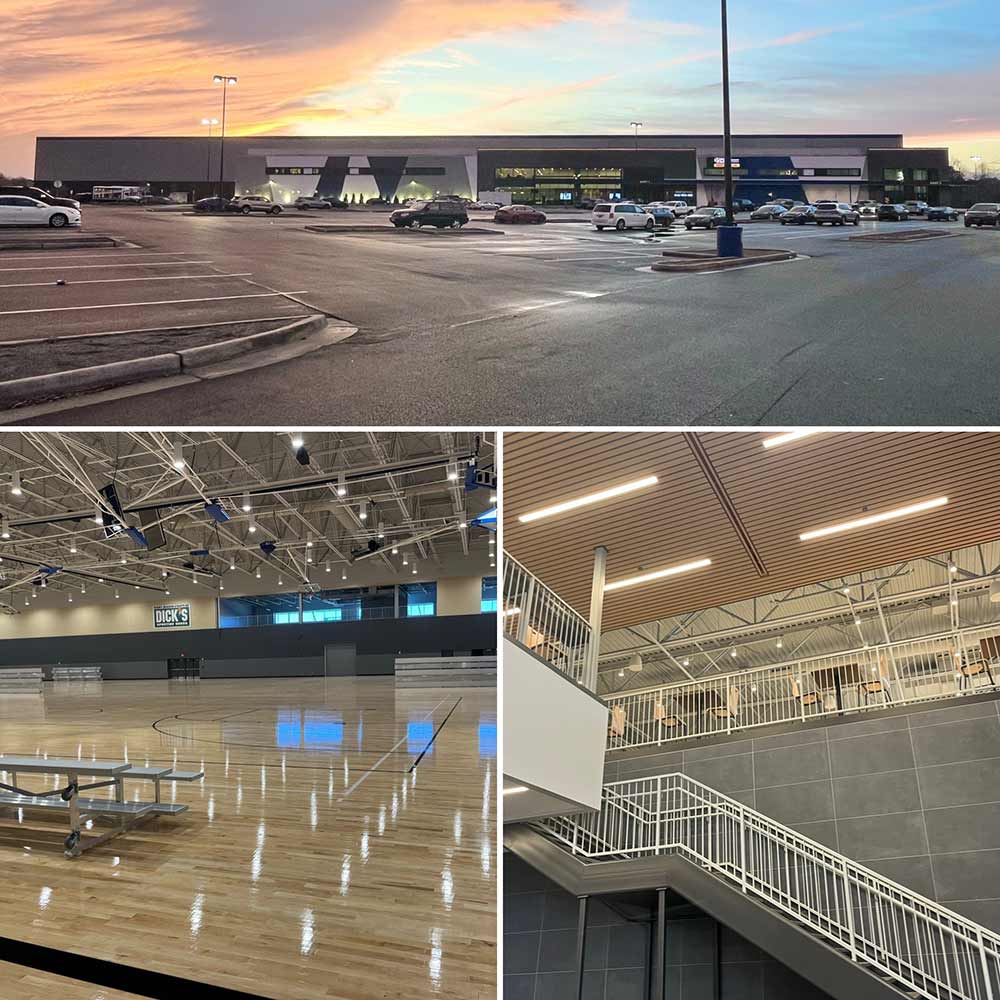
Construction of the Henrico Sports Complex started in 2021 and it began hosting events in October 2023. An official dedication was held December 4, 2023. The $50 million, 185,000-square-foot complex has 115,000 square feet of contiguous court space and flexible seating for up to 4,500 people. The center can be set up for 12 basketball courts or 24 volleyball courts and one side converts into a 3,500-seat arena. Beyond sports, the complex also provides space for music concerts and graduations.
Beyond contributing to job creation and heightened property values, the transformation of anchor stores or a mall into a sports and event center offers several economic development advantages:
- Increased tourism and spending
- Local business growth, including restaurants, bars, and retail
- Additional real estate development opportunities
- Revenue generation through public events, sponsorships, and advertising endorsements
- Elevation of the area’s destination status and appeal
- The utility of a multi-use venue for diverse activities from sports and concerts to trade shows and conventions and community events
Additional News About the Henrico Sports and Events Center:
- “Henrico Leaders Give Glimpse Into Construction of New Indoor Sports Center,” WWBT-TV, September 19, 2022
- “Demolition Begins at Virginia Center Commons for Indoor Sports Facility,” WWBT-TV, January 14, 2021
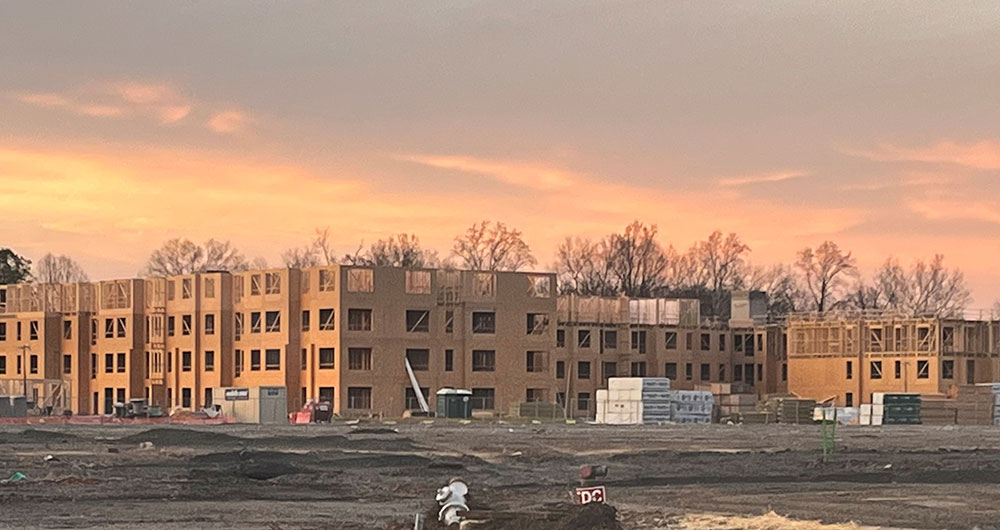
The development underway of new townhomes and apartments, including affordable units, will benefit area businesses and residents alike by providing needed housing close to local employers.
Replacing anchor stores and malls with residential housing has several economic development advantages along with job creation and increased property values, including:
- Urban revitalization
- Diversification of housing options
- Improved quality of life
- Infrastructure improvements, such as roads, utilities, and public spaces
- Attraction of significant business investment
The impact of this and other mall redevelopment projects extends beyond business investment and construction. They breathe new life into the community, creating spaces where people can gather, thrive, and contribute to a vibrant and interconnected environment.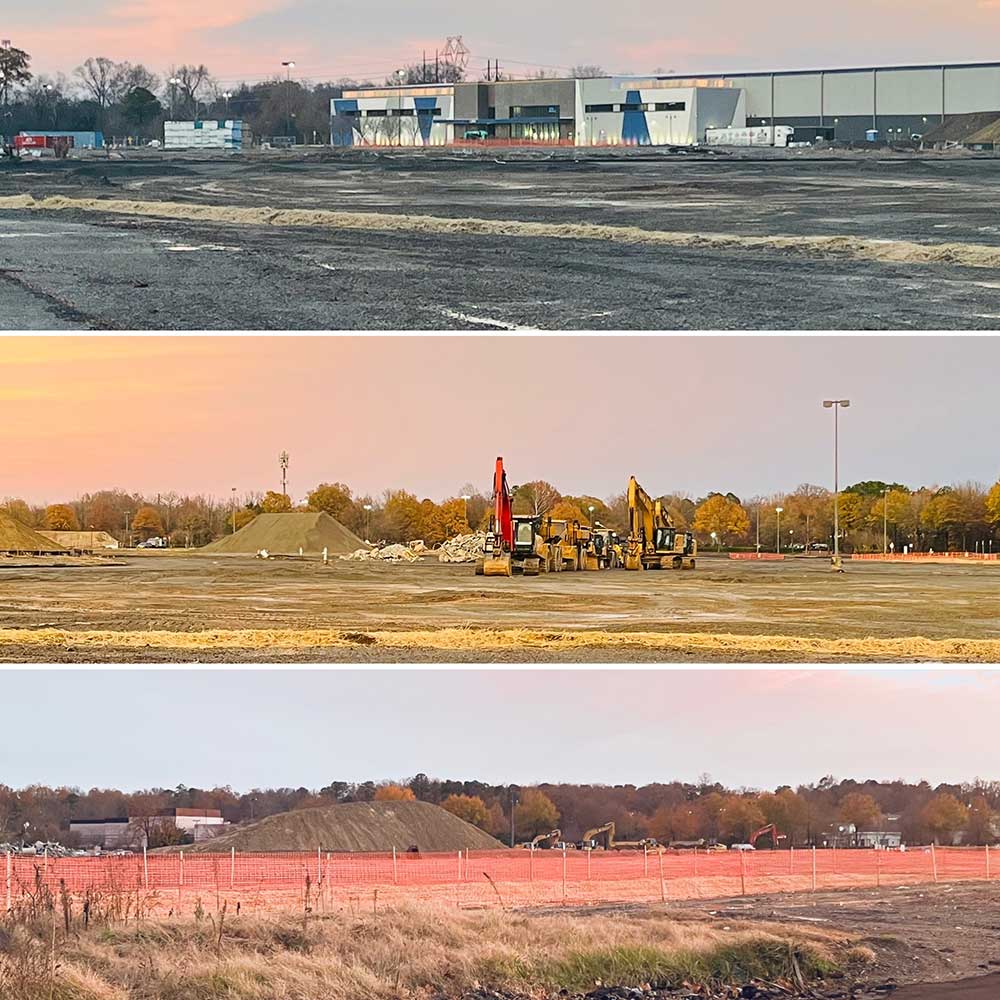
Future plans at the demolished site include the development of open-air walkways and trails and an outdoor marketplace. In addition to fostering job creation and increasing property values, these types of improvements:
- Enhance community well-being and tourism by creating more outdoor recreation options
- Increase foot traffic and retail and commercial opportunities
- Provide venues for community events and festivals
- Improve neighborhood aesthetics
- Provide additional dining options
- Enhance biking and walking infrastructure
Coast to Coast: Examples of Mixed-Use Mall Redevelopments Across America
California: Laguna Hills Mall is being transformed into a mixed-use destination named the Village at Laguna Hills, which will involve the demolition of most of the mall’s structures. The redevelopment project includes up to 465,000 square feet of office space, a 100- to 150-room hotel, 1,500 residential apartment units, and retail and outdoor areas.
Georgia: $70 million in tax reimbursements has been approved for the planned redevelopment of the North DeKalb Mall in Decatur. The $843 million mixed-use development will include offices, retail space, 1,800 housing units (some designated for workforce housing), and infrastructure improvements, with the AMC movie theater remaining.
Michigan: The former Northland Center in suburban Detroit is being demolished to make way for the Northland City Center project, a $403 million redevelopment featuring 1,546 for-rent housing units in 14 five- and six-story buildings with ground-floor retail spaces.
Missouri: Chesterfield Mall is set for a major revamp as the city council approves a zoning change, transitioning the private property from commercial to mixed-use space. The new zoning allows for retail, offices, and over 2,000 apartment units. Demolition of the mall (excluding Dillard’s) is expected to start in late 2023.
North Carolina: Demolition has begun on part of University Place in Chapel Hill as part of a $160 million modernization plan to transform the enclosed mall into a mixed-use development. The plan features six new buildings for restaurants, retailers, and offices, along with 350,000 square feet of retail and restaurant space, 60,000 square feet of office space, 150 hotel rooms, and 253 apartment units, including affordable housing.
Pennsylvania: Century III Mall in West Mifflin is set to be demolished for a potential mixed-use development over the next five years. Redevelopment plans include office, residential, hotel, entertainment, and restaurant spaces, potentially allowing the mall’s lone tenant, JCPenney, to remain.
Texas: The long-awaited demolition of the former Valley View Mall in far North Dallas is underway, making room for a $4 billion mixed-use development featuring office towers, luxury hotels, condos, a movie theater, shopping, and green space.
Next month, in the final article in this series, I will feature another Richmond-area mall that has been repositioned into an outdoor lifestyle center along with examples nationally of other similar transformations.
Before and After Videos: Virginia Center Commons
Virginia Center Commons: The Final Chapter – Raw & Real Retail (December 6, 2020)
DE-MALLISHED – Virginia Center Commons Mall (February 26, 2023)
DEAD MALL: Virginia Center Commons – Glen Allen, Virginia (November 6, 2022)





